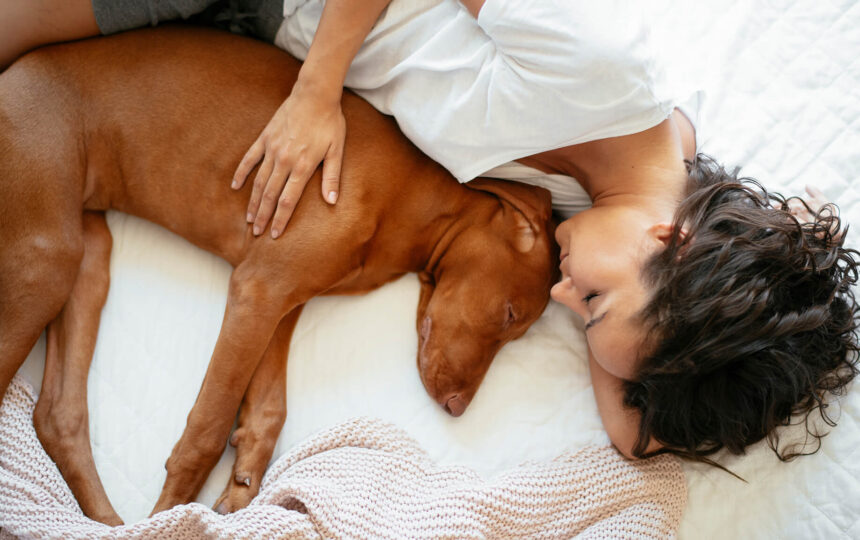You may have heard of the benefits of co-sleeping with your children but what about co-sleeping with your dog? Are there any benefits to sharing your bed with your best furry friend?
One thing is sure, more pet parents than you might think to enjoy a slumber party with their dogs. According to one survey, 55 percent of pet owners admit to sharing their sleeping space with at least one dog. While not all pet parents agree with co-sleeping, those that do find joy and many benefits in practice.
Here are some reasons to consider sleeping with your canine companion.
Improved sleep quality
Although all dog owners may not agree, many say that they experience improved quality of sleep when they share a bed with their furry friend. One study found that pet parents who slept with a dog in their bedroom kept to a sleep routine and slept more efficiently than those who slept without a dog.
Data was gathered from sleep trackers worn by participants and their canine companions. Humans who slept with their dogs received an average of 81 percent sleep efficiency, and dogs had an 85 percent efficiency.
Reduced stress and depression
There is something known as “The Pet Effect,” which is the positive impact pets have on stress and anxiety. According to the 2021 Human Animal Bond Research Institute (HABRI) Benchmark Survey of Pet Owners, 74 percent of pet owners reported that pet owners positively impacted mental health.
From a physiological perspective, snuggling with your dog releases oxytocin – the happy hormone – that reduces stress and improves mood. It can also reduce heart rate and decrease cortisol, the stress hormone. All of these things can lead to deeper and more restful sleep.
Many people with post-traumatic stress disorder ( PTSD) find that the company of their dog at night helps ease anxiousness and nightmares and improves a sense of security.
According to Dr. Raj Dasgutpa, an assistant professor of clinical medicine at the Keck School of Medicine at the University of Southern California,
“People with depression or anxiety may benefit from having their pet in the bed because the pet is a big pillow, a big blanket, and they may feel that snuggly, cuddly, furry creature decreases their anxiety.”
Reduced blood pressure and improved heart health
Sleeping next to your dog may have anti-hypertensive effects. In one study, it was found that petting or even touching a dog had positive impacts on blood pressure readings. Another study by the American Heart Association found a link between pet ownership and a healthy heart.
What better way to manage blood pressure and protect your heart than to fall asleep petting your favorite furry friend?
Increased theta brainwaves
Theta brain waves occur when we are drifting off to sleep or when we are dreaming. These brain waves are essential for the processing of information and making memories. Sleeping next to your dog – which releases oxytocin – may help increase the presence of these important brain waves.
Reduction in pain
A study published in the journal Social Sciences found that people who suffered from poor sleep brought on by long-term chronic pain experienced positive benefits of sleeping with their pooches. According to the study author, Cary brown, professor of rehabilitation medicine at the University of Alberta, snuggling was a distraction that made participants feel secure and less anxious at bedtime, reducing pain levels.
Protection and security
Having your dog sleep with you, especially if you live alone, provides a great deal of protection and a sense of security. With his bionic hearing and keen sense of smell, your pup will be protective and let you know if anything is amiss. Knowing that your loyal companion has your back can help you rest easier.
Strengthens your bond
Dogs are pack animals; they like to be close like their ancestors who slept close to stay warm and ward off danger. Your dog is part of your pack, and they want to be close to you. Spending time with your pooch – even if you are both asleep strengthens your bond and connection.
Provides warmth
You might not need that extra blanket or high heating bill, depending on how large and furry your pooch is. Most dogs put off a lot of heat, which can help keep your energy costs down.
How to get the best night’s sleep with your pup
If you have decided to embrace co-sleeping with your furry friend, here is a quick list of tips to help you and your pet sleep well.
Establish boundaries: Train your dog to where their spot is in the bedroom. Is it at the foot of your bed, in the middle, or on their bed next to you? Try a few options and see what works best for you and your pet. Use positive reinforcement to train your pup to go to the same spot each night. This routine will help everyone get the best sleep possible.
Keep your dog above the covers at all times: Allowing your dog under the covers is a recipe for disaster. Remember, your dog has on a coat and will get hot very quickly underneath the sheets and blankets. No sooner will you fall asleep, and your pip will want up out of the covers, which will surely disrupt your sleep.
Keep your pet clean: Let’s face it – clean dogs are nicer to sleep with than dirty dogs. Keep Your pet clean with regular baths and grooming to keep the dirt out of your bed.
Take your dog out right before bed: To avoid accidents, always allow your dog to use the bathroom before bed. This will prevent any unnecessary wake-ups throughout the night.
Get into a bedtime routine: A bedtime routine is excellent for you and your pet. Try to go to bed at the same time each night and wake up around the same time. Everyone sleeps better with a routine – including your furry friend.
When sharing your bed with your dog is not a good idea
Of course, co-sleeping with a dog may not be the best idea for everyone, and each situation is different. Here are some occasions when there may be better ideas than having your pup in your bed.
Your pup needs to be house-trained: If your dog is young or not house-trained, it is not a good idea to co-sleep. Who wants to wake up in the night to change sheets? Crate training before co-sleeping is a good idea and also helps with house-training.
You are a light sleeper: If sleeping is a challenge for you and every little sound wakes you up, it may be a challenge to share your bed with your pup – especially if they snore or make a lot of noise.
If you or your dog have health issues: If you or your dog are injured or sick, it may not be a good idea to share the same sleeping space. Set up a nice cozy spot next to your bed so your dog can remain close, but you each have your own space.
You have allergies: If you have allergies, sleeping next to your pooch can worsen them. Set up a bed for your dog on the floor next to yours to keep the dander out of your sheets. Doing this will allow you to reap many of the same benefits as sleeping in the same bed without sneezing all night!
You have a new dog: Whether it is a pup or an older dog, it’s best to get to know your new dog before co-sleeping. Developing a solid bond first will make sleeping in the same bed a more enjoyable experience for you and your dog. Take time to play with your new dog, go on walks, and learn about your new furry friend.
Should I let my dog sleep with me?
While there are many noted benefits of having your furry friend sleep with you, it is important to do what is best for you and your pup. If you try letting your dog in bed and it turns out to be a disaster, don’t feel bad. The next best thing would be to get your dog a bed and place it in your bedroom somewhere sot hat your pup is still close but has its own space.
Although dogs are pack animals, some prefer their own space and sleep better apart from their pet parents. The bottom line is that you must do what works best for you and your canine companion. Sleep is essential!






